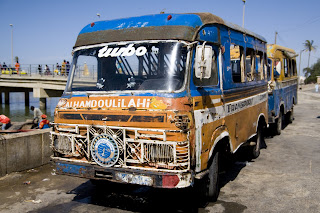

If time is more important than money, there are plenty of local taxi drivers and guides who can arrange transport. Many advertise on the web, or offer individual fares to any destination in thecountry through tourist agencies in the coastal resort. We took advantage of the services of Moses Coley (http://www.realgambiamoses.com/) who, along with his driver Sheriff, drove us from the coast to the Senegal border in the far East of the country, stopping along the way to see wildlife and birds. You can see some of my photos from the trip on his website.
Travelling with a guide has many advantages. Moses has a great knowledge of his country, and many friends and contacts throughout. He took a real pride in ensuring we enjoyed our trip, we told him where we wanted to go, and then on the way between these main destinations he took us to many out of the way places to see the birds and wildlife that were one of the main reasons for our visit to The Gambia. By arranging local guides from remote villages for a relatively small price we managed to make an impression on local people that the wildlife and wild environment around them did have a value, as well as making sure that local people did benefit from our visit. One young man who took us to the fields round his village (one of the best habitats for viewing birds, monkeys and baboons!) had never seen European visitors in his village before. Moses is an enterprising man, keen to develop eco-tourism as a way of benefiting his village. He has recently financed a local school, as well as arranging inovative cultural tourism opportunities, for example the opportunity to get married in a Gambian village ceremony (try 'googling' his name for more info on this!)

One of the things that stuck me most about both Senegal and The Gambia is the strength of Islam. More than once, our driver would stop at the side of the road, take out his prayer mat, and pray. Driving before sun-up was usually accompanied by Islamic music and prayer on the radio, before the driver changed over to local popular music as day broke. Every town had its mosque, many of them new. I maybe shouldn’t have been surprised by this, but I witnessed a mush greater level of religious devotion than I have even in countries such as Pakistan, Iran and the Middle East. Highlights of our trip were national parks in Senegal - Langue de Berberie and Djoudj near St Louis, and Nikolo Kobo in the East - and the Gambia - Aboko, the Bao Bolon wetland area around Tendaba Lodge, and the River Gambia National Park. We also enjoyed visiting Dakar and St Louis in Senegal, eating good food on the Gambian coast and visiting the small up-river towns in The Gambia.
I think Senegal and the Gambia must be amongst the easiest countries in Africa to visit as individual travellers. Both are relatively well developed, and have established tourist industries, although in both these are concentrated in specific areas and easy to leave behind if that is what you want. With a healthy dose of common sense both seemed secure enough, and in both it was easy to find help if long wait for the next, possibly non-existent, minibus just seemed too much! Why not discover them for yourselves?
To see what unique experiences you can have in Senegal, the Gambia and the rest of West Africa, why not have a browse through our selection of responsible and sustainable holiday ideas on our website. Or if you have a particular query, please contact us on info@westafricadiscovery.co.uk.
Comments